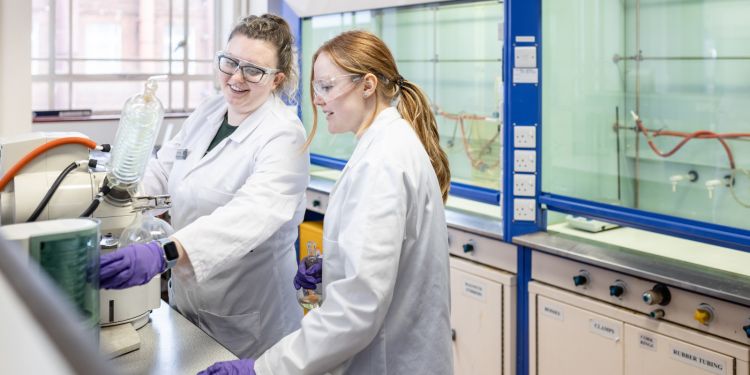Natural Sciences 2023/24
Chemistry

Chemistry is so important to other fields of science. Biological systems are made up of chemical compounds and chemical reactions regulate our bodies’ health. Chemistry explains why and how minerals are formed, and what their structures and properties are. A chemist’s detailed understanding of reaction kinetics is applicable in everything from catalysis to the chemistry of the atmosphere. Our Natural Sciences course offers you many optional chemistry modules, so you can choose topics that fit best with your other subjects.
Subject combinations available:
- chemistry, biology, biochemistry;
- chemistry, biology, environmental science,
- chemistry, biology, food science and nutrition;
- chemistry, biology, mathematics;
- chemistry, biochemistry, chemistry;
- chemistry, biochemistry, environmental science;
- chemistry, biochemistry, food science and nutrition,
- chemistry, biochemistry, mathematics;
- chemistry, environmental science, mathematics;
- chemistry, food science and nutrition, mathematics;
- chemistry, mathematics, physics.
Watching this video in China? View this video on Youku.
Examples in science
Chemistry, biochemistry, biology
Chemical biology
Chemical biology lets us use the power of chemistry to gain new insights into biological systems. Chemical synthesis enables the preparation of specific molecular probes that let us understand biological pathways in ever more detail and understand how nature is controlled at the molecular level.
Novel Therapeutics
The modern day pharmaceutical industry uses combinations of biological and chemical methods to target disease. New therapies could be a small chemical molecule that selectively targets a biological receptor or an antibody that targets a cancer cell. Some modern therapies even contain both biological and chemical components linked together.
Chemistry, maths, physics, maths
Materials science and nanotechnology
New materials with reactive and dynamic properties influence everything, from new electronics to self-repairing polymers and new materials for biomedical applications. To control the global properties of materials correctly, you need to understand how they work at the smallest scale. By combining your knowledge of physics, chemistry and maths, you will gain new insights into the nanoscale world.
Chemistry, environmental science, maths
Science of the atmosphere
The science of the atmosphere controls our everyday lives to such a huge extent that we need to understand the reactions that take place in the atmosphere as well as how species in the atmosphere move and interact. Atmospheric scientists also study other worlds, designing models and experiments to study the atmospheres on extra-terrestrial planets and their moons.

